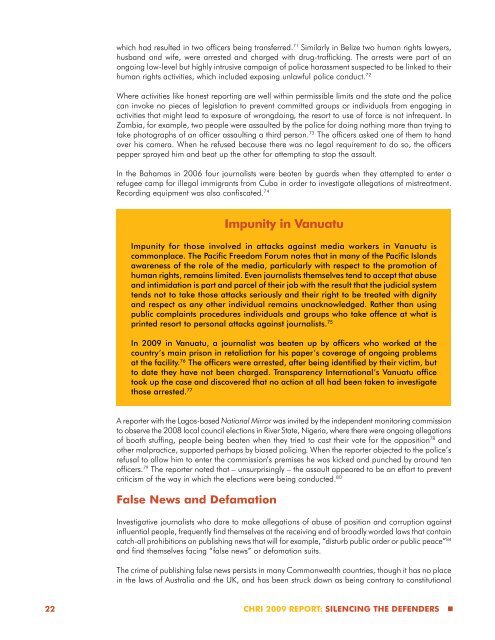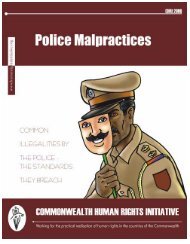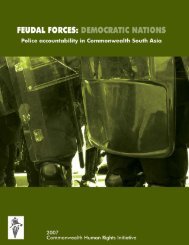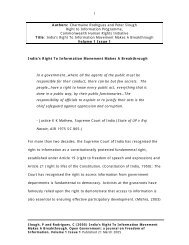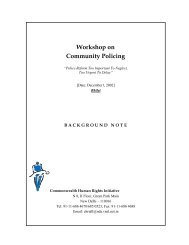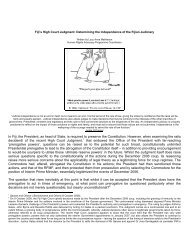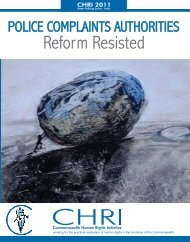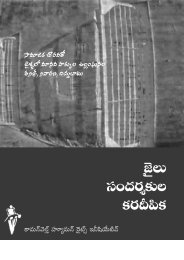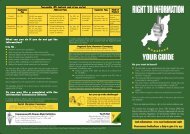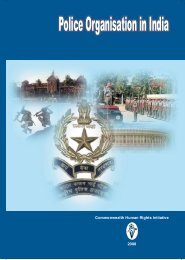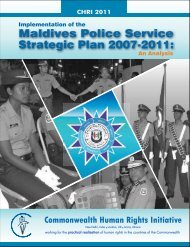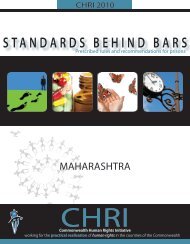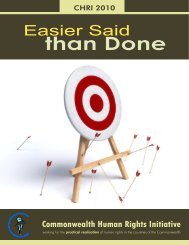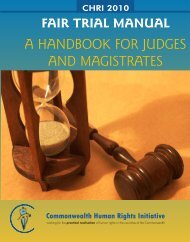Silencing the Defenders - Commonwealth Human Rights Initiative
Silencing the Defenders - Commonwealth Human Rights Initiative
Silencing the Defenders - Commonwealth Human Rights Initiative
Create successful ePaper yourself
Turn your PDF publications into a flip-book with our unique Google optimized e-Paper software.
which had resulted in two officers being transferred. 71 Similarly in Belize two human rights lawyers,<br />
husband and wife, were arrested and charged with drug-trafficking. The arrests were part of an<br />
ongoing low-level but highly intrusive campaign of police harassment suspected to be linked to <strong>the</strong>ir<br />
human rights activities, which included exposing unlawful police conduct. 72<br />
Where activities like honest reporting are well within permissible limits and <strong>the</strong> state and <strong>the</strong> police<br />
can invoke no pieces of legislation to prevent committed groups or individuals from engaging in<br />
activities that might lead to exposure of wrongdoing, <strong>the</strong> resort to use of force is not infrequent. In<br />
Zambia, for example, two people were assaulted by <strong>the</strong> police for doing nothing more than trying to<br />
take photographs of an officer assaulting a third person. 73 The officers asked one of <strong>the</strong>m to hand<br />
over his camera. When he refused because <strong>the</strong>re was no legal requirement to do so, <strong>the</strong> officers<br />
pepper sprayed him and beat up <strong>the</strong> o<strong>the</strong>r for attempting to stop <strong>the</strong> assault.<br />
In <strong>the</strong> Bahamas in 2006 four journalists were beaten by guards when <strong>the</strong>y attempted to enter a<br />
refugee camp for illegal immigrants from Cuba in order to investigate allegations of mistreatment.<br />
Recording equipment was also confiscated. 74<br />
Impunity in Vanuatu<br />
Impunity for those involved in attacks against media workers in Vanuatu is<br />
commonplace. The Pacific Freedom Forum notes that in many of <strong>the</strong> Pacific Islands<br />
awareness of <strong>the</strong> role of <strong>the</strong> media, particularly with respect to <strong>the</strong> promotion of<br />
human rights, remains limited. Even journalists <strong>the</strong>mselves tend to accept that abuse<br />
and intimidation is part and parcel of <strong>the</strong>ir job with <strong>the</strong> result that <strong>the</strong> judicial system<br />
tends not to take those attacks seriously and <strong>the</strong>ir right to be treated with dignity<br />
and respect as any o<strong>the</strong>r individual remains unacknowledged. Ra<strong>the</strong>r than using<br />
public complaints procedures individuals and groups who take offence at what is<br />
printed resort to personal attacks against journalists. 75<br />
In 2009 in Vanuatu, a journalist was beaten up by officers who worked at <strong>the</strong><br />
country’s main prison in retaliation for his paper’s coverage of ongoing problems<br />
at <strong>the</strong> facility. 76 The officers were arrested, after being identified by <strong>the</strong>ir victim, but<br />
to date <strong>the</strong>y have not been charged. Transparency International’s Vanuatu office<br />
took up <strong>the</strong> case and discovered that no action at all had been taken to investigate<br />
those arrested. 77<br />
A reporter with <strong>the</strong> Lagos-based National Mirror was invited by <strong>the</strong> independent monitoring commission<br />
to observe <strong>the</strong> 2008 local council elections in River State, Nigeria, where <strong>the</strong>re were ongoing allegations<br />
of booth stuffing, people being beaten when <strong>the</strong>y tried to cast <strong>the</strong>ir vote for <strong>the</strong> opposition 78 and<br />
o<strong>the</strong>r malpractice, supported perhaps by biased policing. When <strong>the</strong> reporter objected to <strong>the</strong> police’s<br />
refusal to allow him to enter <strong>the</strong> commission’s premises he was kicked and punched by around ten<br />
officers. 79 The reporter noted that – unsurprisingly – <strong>the</strong> assault appeared to be an effort to prevent<br />
criticism of <strong>the</strong> way in which <strong>the</strong> elections were being conducted. 80<br />
False News and Defamation<br />
Investigative journalists who dare to make allegations of abuse of position and corruption against<br />
influential people, frequently find <strong>the</strong>mselves at <strong>the</strong> receiving end of broadly worded laws that contain<br />
catch-all prohibitions on publishing news that will for example, “disturb public order or public peace” 84<br />
and find <strong>the</strong>mselves facing “false news” or defamation suits.<br />
The crime of publishing false news persists in many <strong>Commonwealth</strong> countries, though it has no place<br />
in <strong>the</strong> laws of Australia and <strong>the</strong> UK, and has been struck down as being contrary to constitutional<br />
22 CHRI 2009 REPORT: SILENCING THE DEFENDERS •


